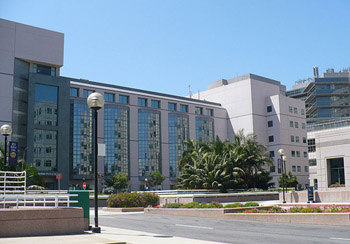WESTWOOD—Last Thursday, nurses statewide were readying themselves to strike. After months at the negotiation table with the University of California system that employs them, the nurses felt uniformly disappointed by the results of the table talks and felt they had to strike as a last resort. However, due to an injunction sent down from Sacramento, the strike was stopped. Although the strike was suspended, the sentiment remains and nurses at UCLA and across the country wait with anticipation for Friday’s deadline, when a judge will hear from both sides of the potential picket line and decide whether the nurses can strike.
Trish Lewis is the representative for CNA (California Nurses Association), which represents the Neonatal Intensive Care Unit at UCLA. When asked about the strike, Lewis stressed that this was the nurses’ “last ditch effort to get what [they] wanted.”
In addition to a 4 percent raise (2 percent to replace their forced pension, which was re-directed into a general retirement fund for the UC system), what they want is contractual protection for the patient/nurse ratio and the assurance that their rest breaks will be both mandated and properly covered by other nurses. The nurses want to ensure that there will be constant care for their patients and additional coverage when a patient needs more individual attention, or a nurse needs to take a break. Though Lewis stresses the fact that UCLA continues to be extremely efficient at maintaining the proper ratios, notably in her NICU where the patients need constant care, they still want to make the ratio and break rules contractually binding. Trish Lewis acknowledges also that the fight is not just for their hospital, it is for nurses across the country and even globally.
The hospital states its argument is “all in the budget.” They continue to assert their view of the nurses’ role as highly valued and indispensable; thus, the concern and outrage at the prospect of a strike. In an e-mail to the nurses, UCSF CEO Mark Lauret writes, “In the end, even a one day strike will cost UCSF potentially millions of dollars that would otherwise be used to support patient care. It will create serious problems for those patients whose lives depend on the care our nurses provide.” For them, the finances of the nurses’ desire for a 4 percent raise and tighter regulations on patient/nurse ratios are not economically sound at this point in time. No one can deny the economic burden that the state is under and the hospitals are part of the UC system and thus state funded. However, Lewis stated, “If we can’t be missed and they think so much of us, why can’t they go to bat for us?”
Patient satisfaction at UCLA remains extremely high. It is one of the top teaching hospitals in the nation. Lewis argues the importance of nurses should be a factor in the hospital’s decision making and that they should be more mindful of what the nurses are arguing for. However, the hospital states budgetary reasons and not that they are being inconsiderate of the nurses’ position. Friday’s court decision will have importance for both sides of this situation, and the future of patient care in California.
On Friday June 18, the injunction was issued. Following the June 8 restraining order which halted a planned one-day strike by UCLA nurses, the injunction bars future strike activity until September 30, at which point the current UC-CNA contract expires.






